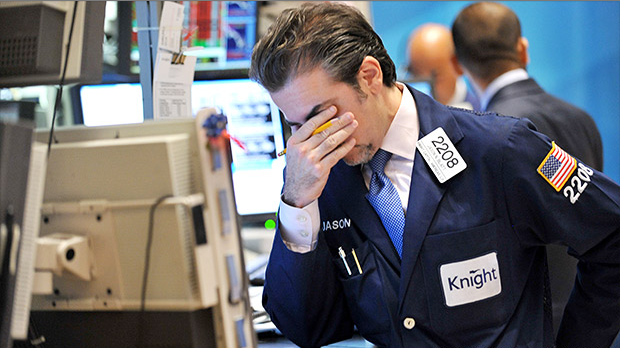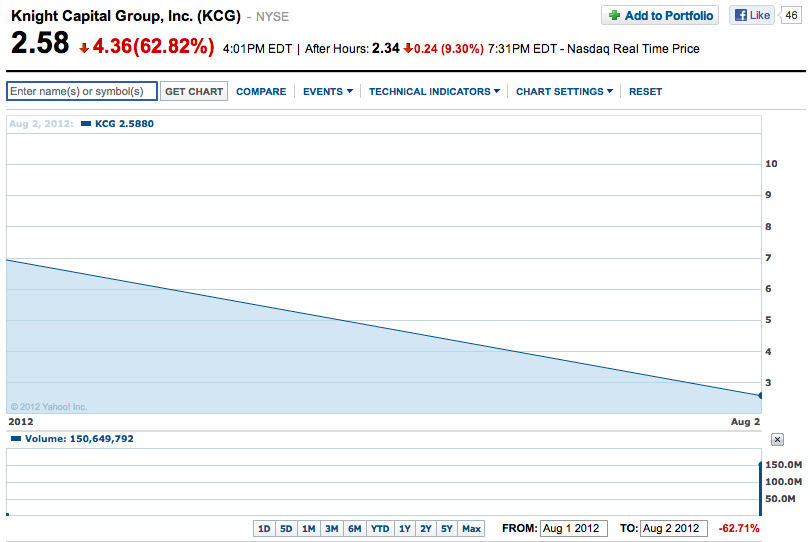
This isn’t a stock photo. It really isn’t. We’ve run similar ones before. On any given day, you can find a trader assuming this position. (Assuming a position! Another double entendre! God, we’re clever)
Knight Capital is hanging by a thread this morning. A formerly robust business, and one of the biggest players on the New York Stock Exchange.
“A Wall Street firm got screwed? Good! Serves those greedy bastards right!”, capitalist oppression, the 1%, etc., etc.
Yeah, except it’s way more complicated than that, and besides, no poor people were hurt in the making of this fiasco. You want the real story, or do you want to sit there and pretend you know what’s going on?
Knight Capital is a market maker. That means if you’ve got a certain security to buy or sell, they’ll sell it to/buy it from you, instantly. Instead of waiting on the rest of the world so you can get the price you want, you can do business with Knight and get your stock or cash at the speed of light.
A market maker does this by keeping separate bid and ask prices. They’ll buy your Baltimore Opera Hat Company stock for, say, $10 a share. At that same moment, if there’s some other investor who wants a piece of Baltimore Opera Hat, he can buy it from a market maker for…$10.05 or so.
It shouldn’t matter to a market maker whether the stock is rising or falling. If Baltimore Opera Hat shoots up in value for some reason – a hostile takeover bid, LeBron James sporting one of the company’s hats ironically at a postgame press conference – a market maker adjusts its bid and ask prices correspondingly. The more powerful a market maker’s algorithms, and the more business it does, the smaller a spread it can offer between bid and ask prices. Taken to the extreme, a cosmically large market maker could buy a security at $10, sell it at $10.0000000000001, and make a profit by sheer volume. Thus market makers do serve a legitimate purpose, letting people trade all the faster. This is a good thing.
When you do business with a market maker, you’re paying for liquidity. Are you really that set on selling your stock at $10.50, knowing it might never get that high? A market maker might drive a hard bargain, but you get your money (or stock, depending on what side of the transaction you’re on) that much more quickly.
Market makers exist with the sanction of the exchange they do business on: Knight is officially designated as a market maker by the New York Stock Exchange. Also, a particular market maker only makes markets for particular securities. You can immediately buy or sell Garmin stock via a certain market maker, say, but not Walgreens stock.
Knight’s largest customers are retail brokerages, not individual investors like you. When you execute an order through your TD Ameritrade account, TD Ameritrade will sometimes (certainly not always) go through Knight.
There are hundreds of firms that operate as market makers, and Knight is one of the biggest, handling 15% of the NYSE’s volume. Was one of the biggest, until a couple of days ago.
Wednesday morning, Knight endured a computer glitch. A bug in the software. Knight started trading stocks at 10, 20 times their normal volume, leading to a concomitant and profound change in prices. Knight’s computers were executing trades that didn’t have a real buyer or seller on the other side. Which isn’t a big deal in and of itself; Knight wasn’t taking possession of people’s actual stock and/or money at false prices, and no individual investor got screwed.
But the trades still counted, and the prices were valid throughout the market. So other firms, ones with error-free information systems, saw the price changes and handled their own trades accordingly. Here, look at the chart and see if you can tell whether Knight was a market maker for Anheuser-Busch:
Knight was forced to trade out of its erroneous positions. It lost $440 million in one day.
no individual investor got screwed.
Wait, that’s not quite true. Knight itself is a publicly traded stock. That $440 million corresponded to a similar hit in Knight’s market capitalization. The company’s value shrank by 2/3 in one day. Here’s what happened to Knight stock overnight:
Understandably, Knight’s clients stopped doing business with it. They had no choice. These are big firms, too – Vanguard, Citigroup and other investment managers.
Just because Knight’s principals and employees wear tailored suits and wing-tips, that doesn’t mean they’re crooks. Far from it. Knight handled the 45-minute glitch the best way possible, immediately halting trades and disclosing everything to their customers, the market and the exchange.
The result is that Knight needs to borrow money, and fast. The company might go bankrupt. Investors hold $375 million in convertible notes issued by Knight, and could demand their money now, given how Knight’s business has changed so abruptly so quickly. (Knight’s biggest bondholders are the actual crooks at Goldman Sachs, but that’s a different lament.) The consensus opinion is that Knight should find a buyer before things get any worse. Yes, a company whose primary service was liquidity could go under for want of its own liquidity.
Speaking of a buyer, Knight’s stock is trading at barely twice earnings. If you’re interested, you probably won’t have to wait long to have your order executed. You might not even need a market maker.
This wasn’t a fault of regulation, or lack thereof. Putting an additional 100 SEC agents on the case wouldn’t have changed a thing. It was an error without malice or criminal intent. Now, go read the comment boards on Yahoo! Finance and see the easily confused blame Knight’s downfall on everything from Mitt Romney to the U.S. military to the Illuminati.




